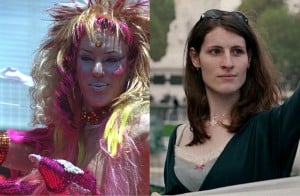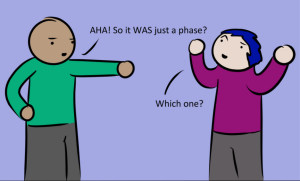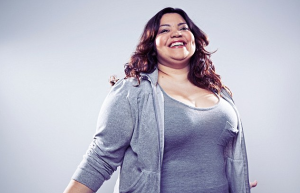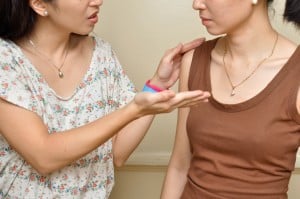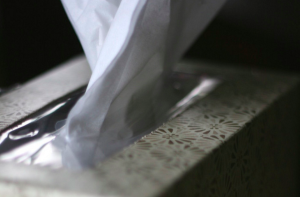
A distressed person in bed, covering their face with their hands and their chest with a pillow.
When eating disorders are discussed in the context of feminism, it’s common to hear one narrative: Women see that models and celebrities are almost all thin, so they learn that’s what’s desirable and aspire to be like them.
But that’s not always how it works. It’s only one part of the connection between sexism and disordered eating.
I struggled with anorexia nervosa and Eating Disorder Not Otherwise Specified (now called Other Specified Feeding and Eating Disorders) throughout high school, and I didn’t know why at the time. I still don’t totally understand the biology and psychology behind my eating disorder, but I believe that much of its development was related to the sociocultural aspect – namely, sexism. And not just in the stereotypical “I wanted to look like models” kind of way.
Here are several ways that misogyny contributed to my eating disorder.
1. By Making Women’s Bodies Out to Be Dangerous
When I was around thirteen and noticed myself growing breasts, I developed fantasies of somehow getting them removed. Some part of me knew that I didn’t want to deal with (what I internalized to be) the consequences of having them.
Comments from adults confirmed this. A family friend of mine told me I looked more “developed” while his eyes darted below my face. A colleague of my dad’s told him he’d better look out for me after seeing me in a low-cut dress.
I wasn’t thinking about this when I cut calories or purged. But it certainly didn’t hurt that the resulting weight loss made me feel less vulnerable to sexualized gazes.
Many feminist theorists have argued that eating disorders can be an attempt to dodge the male gaze, and several studies have found a link between sexual harassment and disordered eating.
Did having a less full figure actually help me? It’s hard to say, but it is what we’re taught, even if it isn’t true: Women who look a certain way are more vulnerable to sexual harassment and assault.
And on top of that, we’re taught that it’s our responsibility not to have a look that leaves us vulnerable.
The same victim-blaming culture that teaches women to avoid tight clothing so they don’t “tempt” rapists also, if less overtly, teaches them not to look too sexual. And one way to avoid “looking sexual” is to have a body with fewer secondary sexual characteristics.
I’m not the only person who has used an eating disorder to avoid sexualization.
Marya Hornbacher writes in Wasted: A Memoir of Anorexia and Bulimia that she learned to fear her body after facing sexual harassment at as young an age as eleven. She went through puberty early, like a disproportionate number of eating disorder victims. She calls puberty a “perverse rite of passage” that, for a girl, often involves “becoming someone dissociated from, and spiteful toward, her body.”
Carol Emery Normandi wrote something similar of her eating disorder, which led to weight gain, but served a similar purpose, in Over It: “I felt safer because I didn’t have to deal with men saying, ‘nice tits’ or ‘Check out her healthy chest,’ or grabbing my butt and breasts. It dawned on me that maybe having some weight on me protected me in a way I didn’t otherwise know how to.”
I remember, in the residential program where I went for eating disorder treatment, I confided in a fellow patient about my fear of my breasts getting bigger. And she said, “That’s something we have to deal with, because men are horny bastards.”
“Why?” I asked.
“Because women’s bodies are beautiful.”
I guess she was trying to be positive. But by saying this, she articulated the fear I’d had throughout my life but been unable to name: that any conventionally “beautiful” features of mine were dangerous.
I’ve since learned that no violation of my body is its fault. But that’s certainly not what I was taught from the get go.
It took a lot of unlearning to reach the point where I wasn’t afraid of having a conventionally attractive body. After all, women are taught that their most attractive features are also their biggest hazards.
2. By Equating Body Type with Gender
As I noticed my body becoming more “feminine,” I also felt more and more like I was expected to conform to a feminine gender role.
After all, our society associates “feminine” qualities – like caring, nurturing, passivity, and subordination – with women and “masculine” ones like proactiveness, strength, aggression, and dignity with men.
On top of that, the way we think about bodies is extremely gendered. Breasts, for example, are considered motherly features that supposedly prove women are built for caretaking and nurturing. And expressions like “empty womb syndrome” and “womb on fire” indicate a belief that having a uterus makes you love kids.
Female bodies are deemed “soft,” and male bodies are deemed “hard,” especially as they mature, which also contributes to how women’s and men’s personalities are viewed. And as women get their periods, they’re considered more emotional and less rational.
Plus, just getting older presents you with more expectations due to gender. As a teenage girl, for example, you start being expected to wear makeup and take care of younger kids.
I wanted none of this.
I’m still questioning whether I identify as a woman, as non-binary, or both at different times, but I do know that I don’t identify as a stereotypical woman. I’m highly logical and rational, I hate kids, and I know what I want and am active in pursuing it. That’s not to say women can’t be like this – just that they’re defying stereotypes by doing so.
As I went through puberty, my need for bras and tampons was a constant reminder that people expected me to look and act “like a woman” – in other words, that I was expected to be someone other than who I was. And since I couldn’t control other people’s impressions, I thought maybe I could control my body.
Not getting my period made me feel less susceptible to being viewed as motherly. Having a “harder” body made me feel less meek. Having smaller breasts made me feel less pressure to be “hot” and sexually passive. Even though these stereotypes aren’t true, they affect us, and it was comforting to have a body type that better “matched” the stereotype of my personality.
3. By Dictating That Women Be Desireless and Unimposing
I don’t identify with femininity, but that doesn’t mean I’ve been immune to the pressures associated with it.
And one pressure imposed upon women in our society is to lack physical desires, particularly the desire for food and the desire for sex.
During Victorian times, women were warned against excessive consumption of food – particularly meat – because it was viewed as a contributor to sexual appetite. “Because appetite was regarded as a barometer of sexuality, both mothers and daughters were concerned about its expression and control,” Joan Jacobs Brumberg wrote in “The Appetite as Voice.”
Even to this day, the “ideal” woman is one who is devoid of desires. As Jill Filipovic aptly points out in Cosmopolitan, she fits Paris Hilton’s description of herself as “sexy, but not sexual.” She’s an object of others’ desires, but she doesn’t have any desires of her own.
And, relatedly, she’s not supposed to really want food. She’ll eat it, but she doesn’t love it – or else she’s “masculine.” In fact, women are expected to restrict their food intake in our diet culture.
This idea connects to a larger fatantagonistic idea that wanting food makes you greedy, lustful, and uncontrollable – all the things a woman is not supposed to be. Fatantagonism and sexism are very intertwined.
The ideal of women as ascetic also reflects the social norm that women should not take up a lot of attention. The idealized female body, after all, is one that doesn’t take up a lot of space.
I’ve seen these cultural associations reflected in my own eating disorder. When I ate what felt like a lot to me, I felt unladylike. When my body was larger than I wanted it to be, I felt imposing. And when I restricted my food intake, I felt delicate and dainty and feminine.
I also noticed that during the time when I was restricting food, I felt less sexual. Maybe that’s just because of our cultural association between food and sex, or maybe I physically had less energy.
Whatever the reason, studies show that women with eating disorders engage in less sexual activity and women with anorexia have lower sex drives before weight and diet restoration. For me, restricting both food and sex made me feel like I was more in control.
Limiting my food intake and sexuality was a way for me and many eating disorder survivors to perform femininity, which reveals how problematic our society’s definition of femininity really is.
4. By Defining Women By Their Looks
I won’t write this whole article without mentioning the thin ideal in the media. But I’m going to make it a little more complicated.
Since we define women by their looks, it’s no wonder women end up wanting to gain control over their bodies, which is often what eating disorder victims are often trying to do, as Naomi Wolf points out in The Beauty Myth.
By gaining control over our bodies, we gain (perceived) control over our identities.
This desire for control can manifest in a variety of ways, like wanting to take up less space and look less threatening, wanting to be less sexualized, and yes, wanting to be conventionally beautiful (though, as I mentioned, that doesn’t mean one thing – curves are also sometimes considered conventionally beautiful).
Everybody, but women especially, face stereotypes based on what they look like. Thin girls are considered neat and put together and socially desirable. Curvy girls are deemed “slutty.” Fat girls are viewed as lazy. And conventionally unattractive girls, including fat ones, are considered worthless.
Think about it: From Cinderella and The Little Mermaid to Bridesmaids and Mean Girls, the fat girl in the media is the comedic character at best and the villain at worst.
In a society that associates thinness with worth, especially for women, it’s no wonder women will go to great lengths to be thin.
This may sound contradictory, since I also mentioned eating disorders can sometimes be a method to avoid attracting sexual attention.
But I’m allowed to be contradictory. Society is contradictory. Sometimes, for example, thin is depicted as sexy, and sometimes, curvy is depicted as sexy.
As feminist theorist Susie Orbach points out in Hunger Strike, eating disorders can be ways of complying with patriarchy or defying it. And often, the same person will have an impulse to do both.
***
The same way that sexism contributed to my eating disorder, I believe feminism helped me heal from it.
Women who display more eating disorder symptoms also tend to hold more negative attitudes toward sexuality, so it’s no surprise that sex-positivity helped me. My first year of college, when I started to live symptom-free, was also when I started learning a healthier model of sexuality.
I attended talks on sexual assault where I learned that rape was an act of violence, not something men did naturally because they were so tempted by women’s beauty.
I took a sexuality workshop where I learned that it was normal and okay to have my own desires and not just be an object of others’.
I had friends and mentors who were better role models than my parents when it came to modeling real healthy eating.
And I learned that I got to define my own gender identity, no matter how “feminine” my body looked.
One of the reasons feminism has become so important to me over the years is that it has allowed me to challenge oppressive ideas with deep-seated consequences for my mental health.
For me and so many other eating disorder survivors, recovery doesn’t just happen in one person’s life. It happens as you change the entire environment that allowed the eating disorder to thrive.
That environment consists of much, much more than fashion magazines. It has existed for centuries and deeply ingrained itself in the Western world’s collective mind.
It includes the denial of women’s sexual desires and bodily autonomy, the enforcement of the gender binary, and rape culture. And it has led to the collective suffering of many, many women.
Recovering from my eating disorder felt like trying to pull a weed out of the ground and realizing it had these miles-long roots that were also tangled up with other weeds. The roots still stretch on and on.
While I’m not glad I had an eating disorder, I am glad that it’s given me the opportunity to see all these societal problems in action.
I hope my own experience can help others who are gaslighted about the oppression they face know that these problems have affected them in very real ways because they are very real.
A lot of eating disorder suvivors aren’t told this. Not everyone who has an eating disorder is lucky enough to get treatment at all, let alone feminist-leaning treatment. I certainly didn’t.
I’ve had professionals suggest I may have been sexually abused because of the way I objectified myself, as if women weren’t regularly taught self-objectification. Therapists have told me things like “be proud to be a woman” and “women’s bodies are so amazing” without ever letting me know I had the option to define myself.
There was one therapist, though, who let me know that whatever I do with my body is up to me. And that helped a lot.
So that’s what I hope you can realize if you’re struggling with an eating disorder or another mental health consequence of sexism.
I also hope you get that this is not just you. You are not crazy. You are responding very sanely to an effed up world.
And I hope you know your appearance doesn’t dictate who you are and isn’t to blame for the way people treat you. You can be who you want to be no matter how your body looks, and any false conclusions people draw about you based on your appearance are their problem.
These are all things that feminism teaches us – and that’s why having an eating disorder made me realize just how much we need feminism.
[do_widget id=’text-101′]
Suzannah Weiss is a Contributing Writer for Everyday Feminism and a New York-based writer whose work has appeared in The Washington Post, Salon, Seventeen, Buzzfeed, The Huffington Post, Bustle, and more. She holds degrees in Gender and Sexuality Studies, Modern Culture and Media, and Cognitive Neuroscience from Brown University. You can follow her on Twitter @suzannahweiss.
Search our 3000+ articles!
Read our articles about:
Our online racial justice training
Used by hundreds of universities, non-profits, and businesses.
Click to learn more






